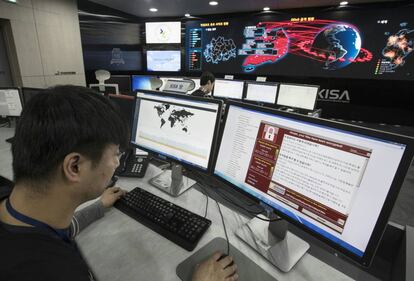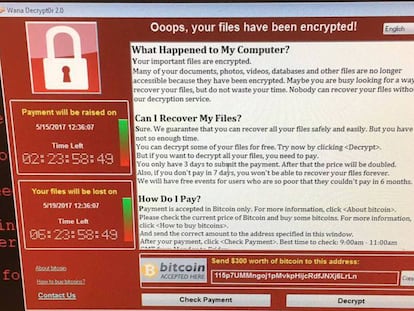Spanish security expert warns of “critical risk” of a cyberattack
Civil Guard official tells Congress that much more needs to be done to keep the country safe from attempts to target computer systems


A high-ranking official with Spain’s Civil Guard has warned parliament that there is a “critical risk” of a cyberterrorist attack in the country.
Speaking before a congressional committee on Tuesday, Colonel Luis Fernando Hernández García said it was important to maintain “a military tactic: be prepared to respond to the most dangerous hypothesis.”
We are headed towards a future led by large corporations above and beyond the states
Colonel L. F. Hernández García
The official added that behind many of the conflicts being waged in the cyberworld today, there are “hostile states trying to destabilize other states,” although he refused to name any specific countries.
“We are expecting black swans,” he said, using a cybersecurity term for improbable events with unpredictable consequences.
Hernández García, who has more than 20 years’ experience dealing with cybersecurity threats, urged lawmakers sitting on the National Security Mixed Committee not to underestimate the risk of an attack. For nearly two-and-a-half hours, the colonel painted a pessimistic picture and said that Spain could face “extremely complicated situations.”
“It is my duty to convey the most objective vision possible. And what we have is cause for concern. I ask you to take note and urge the executive to improve security. The welfare and future of Spanish society depend on it,” he told the committee members.
Although governments and institutions such as the European Union and NATO have been conducting awareness campaigns for years, it is unusual to hear such strong assertions from an official directly involved in containing cyberattacks.
This expert said that most cyberattacks are launched for economic reasons, but that around 5% could be described as cyberterrorism. “We are detecting worrisome behavior within Jihadist terrorism,” he stated.
I urge the executive to improve security. The welfare and future of Spanish society depend on it Colonel L. F. Hernández García
The colonel underscored the risk of so-called hybrid wars, which use destabilizing mechanisms such as manipulation and threats on critical infrastructure. This, he said, poses “the greatest risk of all for democratic states.”
“There is disinformation and intoxication by foreign powers, by actors who are for the most part states, but also individuals seeking to polarize or confront parts of society,” he said. Most of these attacks go unpunished because it is difficult to prove who was behind them.
Russia
Although these types of practices have been more or less explicitly attributed to Russia in the past, the expert refused to name any countries, referring instead to “the most powerful ones, the ones with veto power at the United Nations Security Council. The five permanent members are Russia, United States, China, France and Britain.
The colonel did not mention Catalonia at any time throughout his lengthy address. When a deputy for Catalonia’s En Comú Podem party asked if Estonia provided tech assistance to Catalan leaders in connection with the outlawed referendum of October 1, 2017, Hernández García simply replied that “if that country had reached deals with Catalonia, it would have been a great disloyalty to the Spanish state.”
Private infrastructure
In Spain, 80% of critical infrastructure (water and energy supply, air traffic and more) is in private hands. “We need synergies [between the public and private sectors],” said Hernández García, citing a case in Britain two years ago when authorities detected an attempt to tamper with a city’s water treatment plants.
This expert expressed concern at the fact that companies, a lot more than state agencies, are the guardians of key information. “Citizens believe that the state has huge macrodata at its disposal. If only. That would make our work a lot easier. But we are headed toward a future led by large corporations above and beyond the states.”
English version by Susana Urra.
Tu suscripción se está usando en otro dispositivo
¿Quieres añadir otro usuario a tu suscripción?
Si continúas leyendo en este dispositivo, no se podrá leer en el otro.
FlechaTu suscripción se está usando en otro dispositivo y solo puedes acceder a EL PAÍS desde un dispositivo a la vez.
Si quieres compartir tu cuenta, cambia tu suscripción a la modalidad Premium, así podrás añadir otro usuario. Cada uno accederá con su propia cuenta de email, lo que os permitirá personalizar vuestra experiencia en EL PAÍS.
En el caso de no saber quién está usando tu cuenta, te recomendamos cambiar tu contraseña aquí.
Si decides continuar compartiendo tu cuenta, este mensaje se mostrará en tu dispositivo y en el de la otra persona que está usando tu cuenta de forma indefinida, afectando a tu experiencia de lectura. Puedes consultar aquí los términos y condiciones de la suscripción digital.









































